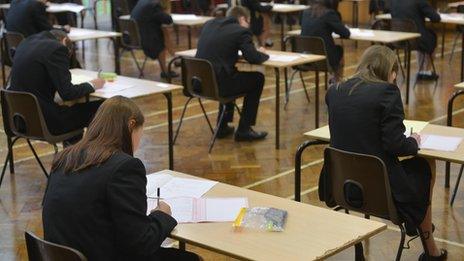Schools make 'tactical exam appeals' to boost scores
- Published

Appeals focus on critical grade boundaries, says Ofqual
Schools are playing the exam system by lodging "tactical" appeals to boost their results, says a report.
England's exams regulator Ofqual says teachers are requesting re-marks in high numbers of GCSE and A-levels with results near key grade boundaries.
Heads see appeals over pupils with marks just below a grade boundary as a "one-way bet", it says, because these are likely to lead to a higher grade.
Ofqual chief Glenys Stacey plans to overhaul the exam appeals system.
Following a comprehensive review of the quality of marking in A-levels, GCSEs and other examinations, Ms Stacey said it was good overall in England.
But she acknowledged that confidence in the marking process was declining among teachers, and said the system could be "better still".
Singling out the exam appeals system for criticism, she said it had been "under increasing pressure, particularly from accountability measures". These included school performance tables and the requirement that schools ensure 40% of pupils gain five good GCSEs including English and maths.
She highlighted the fact that appeals focused on the C-D boundary at GCSE, with nearly 40% of all appeals coming from this group of candidates. At A-level the focus was on the A-B boundary with almost 35% of appeals coming from those graded B.
The report said: "Schools and colleges that are aware of subjectivity in marking know an enquiry about results may lead to a change in marks.
"Where students' marks are just below a key grade boundary, the likelihood is their grade will improve or, at worst, stay unchanged as a result of the enquiry.
"This led some head teachers to describe the practice of entering enquiries about results just below the grade boundaries as a 'one-way bet'."
'Innocent era'
Ms Stacey said: "The analysis that we have done is showing that there are tactical appeals at critical grade boundaries," adding that the current system had been designed in a "more innocent era".
She continued: "My assumptions are that appeals are particularly focused at these particular grades - the C grade in particular in English and maths at GCSE and the A grade at A-level - because these are so important to teachers, to students and to schools and their standing.
"The weight that is put on these grades will encourage these appeals.
"What we are saying is that we are going to go back to the drawing board with the aim of creating a system that is fair, transparent and effective."
'Needs addressing'
The report also found that it was not possible to compare the quality of marking between exam boards. Ofqual is to work with the boards to draw up common parameters to enable comparison between them.
Brian Lightman, general secretary of the Association of School and College Leaders, said this lack of possible comparison was "clearly an area that needs addressing".
"Large inconsistencies or marking errors can have significant consequences for the students affected and the current appeals system does not enjoy the confidence of schools and colleges. We hope that, following this report, these will now be addressed.
"ASCL recognises that the enquiries about results and the appeals system need changing. However, we are disappointed that the report gives no indication of the importance of engaging with school leaders on proposed changes.
"Changes must be fair to all candidates and the right to appeal against an initial decision must be retained."
Schools often enter pupils with marks just below a significant grade boundary for appeals as a matter of course because of the scale of importance for the pupil in achieving the grade.
Mark Dawe, chief executive of Oxford, Cambridge and RSA Examinations, noted that Ofqual found the system "well organised with tight quality controls" and that it was far better than was "sometimes perceived".
He added: "We recognise however that there is room for improvement. All of us - exam boards, regulators and the profession - need to improve trust by raising the profile of assessment and understanding of the process."
AQA and Pearson also welcomed the report adding that they would work hard with the regulator to ensure candidates got the right marks.
- Published30 October 2013
- Published7 June 2013